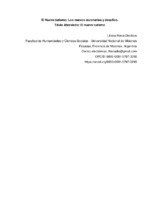El nuevo turismo : los nuevos escenarios y desafíos
Abstract
Los seres humanos están viviendo una época con grandes cambios desde la llegada de la tecnología digital a la vida cotidiana, pasando por la irrupción del teléfono celular y las computadoras personales; el servicio de internet “que acerca todo, pero que aleja a todos”, y con cambios cada vez más vertiginosos, que llevan una realidad más compleja y a un futuro incierto, donde aparentemente ciertos valores y prioridades del pasado se volvieron banales: Sygmund Bauman habla de una sociedad de consumo y una modernidad líquida. Las nuevas generaciones de personas Millennials y Centennialls que tienen otras motivaciones e intereses y una oferta turística aún muy relacionada con los atractivos, y que no priorizan actividades y experiencias. Por otro lado, hay planteos como los de Pyne y Gilmore quienes hablan de la economía de la experiencia, Andrés Openhaimer que dice que las personas deben crear o morir y hasta una guía para sobrevivir al presente, ofrecida por el autor argentino Santiago Bilinkis. Se sabe que el futuro siempre implica incertidumbre, pero la proyección actual parece estar aún más cargada de dudas y confusión.
El turismo como actividad socio económica y consumo ha tenido sus puntos de inflexión a lo largo de la historia humana y el año 2020 con la Sindemia del Covid -19 se podría estar ante uno de ellos, lo cual exige repensar como será en el futuro el turismo, más allá, pero también condicionado por la pandemia. Este ensayo busca reflexionar acerca de este escenario de mediano y largo plazo a nivel nacional y mundial.
Para ello, se analizarán libros de diversos autores con abordajes generales y de turismo, destacando la implicancia social y económica del futuro de esta actividad y su adecuación a los nuevos tiempos. Human beings are experiencing a time of great change from the arrival of digital technology to everyday life, through the emergence of the cell phone and personal computers; the Internet service "that brings everything closer, but that moves everyone away", and with increasingly dizzying changes, which lead to a more complex reality and an uncertain future, where apparently certain values and priorities of the past have become banal: Sygmund Bauman speaks of a consumer society and a liquid modernity. The new generations of Millennials and Centennial people who have other motivations and interests and a tourist offer that is still closely related to attractions, and who do not prioritize activities and experiences.
On the other hand, there are proposals like those of Pyne and Gilmore who speak of the economy of experience, Andrés Openhaimer who says that people must create or die and even a guide to survive the present, offered by the
Argentine author Santiago Bilinkis. It is known that the future always implies uncertainty, but the current projection seems to be even more fraught with doubt and confusion.
Tourism as a socio-economic activity and consumption has had its turning points throughout human history and the year 2020 with the Covid -19 Syndemic could be one of them, which requires rethinking how the future will be tourism, beyond, but also conditioned by the pandemic. This essay seeks to reflect on this medium and long-term scenario at the national and global level.
For this, books by various authors with general and tourism approaches will be analyzed, highlighting the social and economic implications of the future of this activity and its adaptation to the new times.
Collections
The following license files are associated with this item:



